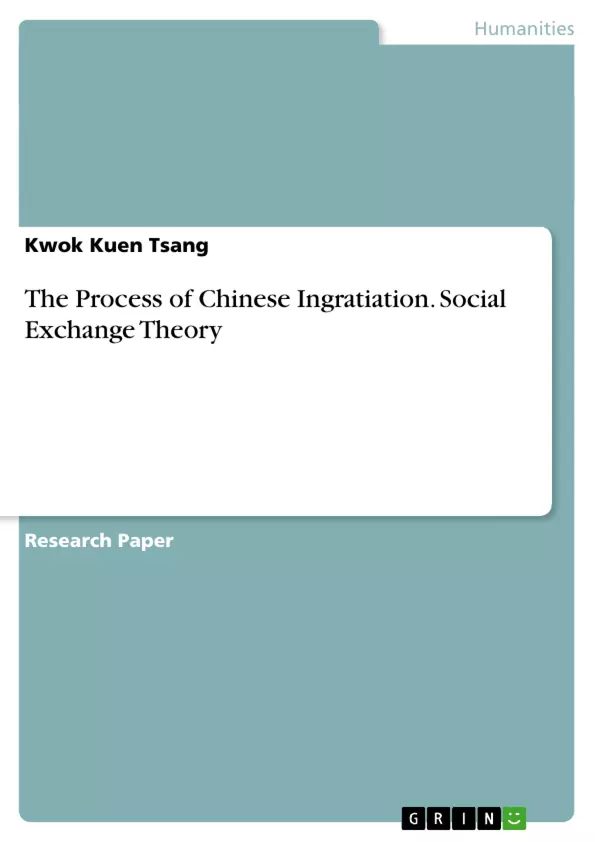The existing literature does not effectively explain the process of ingratiation. Thus, the purpose of this study is to understand the process with social exchange theory. Using an online questionnaire survey, this study interviewed 113 participants from Hong Kong and investigated how ingratiation affects interpersonal relation through the enhancement of interpersonal attraction, exchange of renqing and exchange of mianzi. The results showed that the participants may ingratiate others with five tactics, including self-presentation, conformity, favor-rendering, other-enhancement and modesty. The results also proposed three possible processes of ingratiation: (1) favor-rendering induces exchange of renqing, but exchange of renqing does not impact on interpersonal attraction; (2) all the ingratiation tactics except modesty promote exchange of mianzi, but exchange of mianzi has not influences to interpersonal relation; (3) self-presentation and favor-rendering enhance interpersonal attraction and in turn improve interpersonal relation. It is also suggested that if ingratiation can enhance interpersonal attraction, it will have greater contributions to interpersonal relation.
Inhaltsverzeichnis (Table of Contents)
- Abstract
- The Concept of Ingratiation
- The Process of Ingratiation
- Enhancement of Interpersonal Attraction
- Exchange of Renqing
- Exchange of Mianzi
- The Tactics of Ingratiation
- The Measurement of Constructs
- Methodology
- Participants
- Procedure
- Measures
- Results
- Discussion
- The Process of Ingratiation
- The Tactics of Ingratiation
- Theoretical Implications
- Practical Implications
- Limitations and Directions for Future Research
- Conclusion
- References
Zielsetzung und Themenschwerpunkte (Objectives and Key Themes)
This study examines the process of ingratiation in Chinese societies using social exchange theory. The primary objective is to understand how ingratiation tactics, such as self-presentation, conformity, favor-rendering, other-enhancement, and modesty, influence interpersonal relationships through the enhancement of interpersonal attraction, exchange of renqing, and exchange of mianzi. The study aims to identify the specific processes by which ingratiation tactics impact these different aspects of interpersonal relationships and ultimately contribute to the overall development of positive relationships. Key themes explored in the study include:- The process of ingratiation and its role in Chinese social dynamics
- The impact of various ingratiation tactics on interpersonal attraction, exchange of renqing, and exchange of mianzi
- The relationship between ingratiation and interpersonal relations in a Chinese cultural context
- The application of social exchange theory to understand the dynamics of ingratiation
- The multifaceted nature of ingratiation and its implications for cultural and social understanding
Zusammenfassung der Kapitel (Chapter Summaries)
The study begins by providing a comprehensive overview of the concept of ingratiation, addressing its multifaceted nature and challenging previous assumptions about its role in Chinese societies. The authors argue that ingratiation should be viewed as a social action of social exchange, rather than solely an attraction-seeking behavior or a guanxi management strategy. This perspective emphasizes the instrumental and expressive aspects of social exchange, suggesting that ingratiation is a natural phenomenon rather than an ethical or unethical strategy.
The study then delves into the process of ingratiation, proposing that it involves three key components in Chinese societies: enhancement of interpersonal attraction, exchange of renqing, and exchange of mianzi. Each component is explored in detail, outlining the mechanisms through which ingratiation can influence these aspects of interpersonal relationships. The authors highlight how various ingratiation tactics, such as self-depreciation, instrumental dependency, and other-enhancement, can impact individual's perceptions, motivations, and ultimately, their relationships.
The study further examines the various tactics of ingratiation employed in Chinese contexts, providing specific examples of each tactic and their potential impact on interpersonal relationships. The authors also discuss the measurement of constructs, outlining the specific methods used to assess ingratiation, interpersonal attraction, exchange of renqing, and exchange of mianzi in their study. The methodology section details the research design, participants, procedures, and measures employed to collect and analyze data.
Schlüsselwörter (Keywords)
The study centers around key concepts and themes related to ingratiation, interpersonal attraction, exchange of renqing, exchange of mianzi, and interpersonal relationships within a Chinese cultural context. These themes are explored through the lens of social exchange theory, highlighting the multifaceted nature of ingratiation and its impact on social dynamics.What is "ingratiation" in the context of this study?
Ingratiation is viewed as a social exchange tactic used to enhance interpersonal attraction and manage relationships within Chinese societies.
What are the five tactics of ingratiation identified in the research?
The tactics are self-presentation, conformity, favor-rendering, other-enhancement, and modesty.
How do "Renqing" and "Mianzi" relate to ingratiation?
Renqing refers to the exchange of social favors, while Mianzi refers to "face" or social status. Ingratiation tactics often aim to exchange or enhance these two cultural components.
What was the methodology used in this study?
The study used an online questionnaire survey with 113 participants from Hong Kong to analyze the impact of ingratiation on interpersonal relations.
Does modesty improve interpersonal attraction according to the results?
The results suggested that while most tactics promote exchange, modesty did not show a significant impact on exchange of mianzi or interpersonal attraction in the same way as self-presentation.



